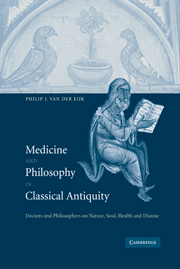 Medicine and Philosophy in Classical Antiquity
Medicine and Philosophy in Classical Antiquity Book contents
- Frontmatter
- Contents
- Acknowledgements
- Note on translations
- Note on abbreviations
- Introduction
- I HIPPOCRATIC CORPUS AND DIOCLES OF CARYSTUS
- II ARISTOTLE AND HIS SCHOOL
- 5 Aristotle on melancholy
- 6 Theoretical and empirical elements in Aristotle's treatment of sleep, dreams and divination in sleep
- 7 The matter of mind: Aristotle on the biology of ‘psychic’ processes and the bodily aspects of thinking
- 8 Divine movement and human nature in Eudemian Ethics 8.2
- 9 On Sterility (‘Hist. an. 10’), a medical work by Aristotle?
- III LATE ANTIQUITY
- Bibliography
- Index of passages cited
- General index
9 - On Sterility (‘Hist. an. 10’), a medical work by Aristotle?
Published online by Cambridge University Press: 22 September 2009
- Frontmatter
- Contents
- Acknowledgements
- Note on translations
- Note on abbreviations
- Introduction
- I HIPPOCRATIC CORPUS AND DIOCLES OF CARYSTUS
- II ARISTOTLE AND HIS SCHOOL
- 5 Aristotle on melancholy
- 6 Theoretical and empirical elements in Aristotle's treatment of sleep, dreams and divination in sleep
- 7 The matter of mind: Aristotle on the biology of ‘psychic’ processes and the bodily aspects of thinking
- 8 Divine movement and human nature in Eudemian Ethics 8.2
- 9 On Sterility (‘Hist. an. 10’), a medical work by Aristotle?
- III LATE ANTIQUITY
- Bibliography
- Index of passages cited
- General index
Summary
Whether its title, ὐπ⋯ρ τοũ μ⋯ γενν⋯ν (‘On Sterility’, ‘On Failure to Produce Offspring’), is authentic or not, the work transmitted as ‘Book 10’ of Aristotle's History of Animals (Hist. an.) deals with a wide range of possible causes for failure to conceive and generate offspring. It sets out by saying that these causes may lie in both partners or in either of them, but in the sequel the author devotes most of his attention to problems of the female body. Thus he discusses the state of the uterus, the occurrence and modalities of menstruation, the condition and position of the mouth of the uterus, the emission of fluid during sleep (when the woman dreams that she is having intercourse with a man), physical weakness or vigour on awakening after this nocturnal emission, the occurrence of flatulence in the uterus and the ability to discharge this, moistness or dryness of the uterus, wind-pregnancy, and spasms in the uterus. Then he briefly considers the possibility that the cause of infertility lies with the male, but this is disposed of in one sentence: if you want to find out whether the man is to blame, the author says, just let him have intercourse with another woman and see whether that produces a satisfactory result.
- Type
- Chapter
- Information
- Medicine and Philosophy in Classical AntiquityDoctors and Philosophers on Nature, Soul, Health and Disease, pp. 259 - 276Publisher: Cambridge University PressPrint publication year: 2005
- 2
- Cited by


